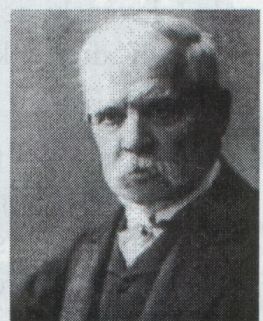Vatroslav Jagić facts for kids
Quick facts for kids
Vatroslav Jagić
|
|
|---|---|

Vatroslav Jagić
|
|
| Born | July 6, 1838 |
| Died | August 5, 1923 (aged 85) |
| Nationality | Croatian |
| Alma mater | University of Vienna |
| Scientific career | |
| Fields | Philologist-slavist, linguist, paleographer |
| Institutions | University of Vienna Odessa University (Novorossiysk University) Saint Petersburg State University Humboldt University of Berlin |
| Doctoral advisor | Franz Miklosich |
| Doctoral students | Ivan Franko |
| Other notable students | Aleksander Brückner |
| Influences | Juraj Križanić |
Vatroslav Jagić (born July 6, 1838 – died August 5, 1923) was an important Croatian expert in Slavic studies. He studied the languages, history, and cultures of Slavic people during the late 1800s and early 1900s.
Contents
Life and Education
Vatroslav Jagić was born in Varaždin, a city in what is now Croatia. He went to elementary school and started high school there. He finished his high school education in Zagreb.
Jagić was very interested in philology, which is the study of language in written historical sources. Because of this, he moved to Vienna to study Slavic languages. His teacher there was Franz Miklosich, a famous Slavic scholar.
Jagić continued his studies and earned his PhD in Leipzig, Germany, in 1871. His special paper for his PhD was about the Croatian language.
Early Career in Croatia
After finishing his studies, Jagić returned to Zagreb. From 1860 to 1870, he worked as a high school teacher.
In 1869, he became a full member of the Yugoslav Academy of Sciences and Arts. This important group is now called the Croatian Academy of Sciences and Arts. He also became a member of the Russian Academy of Sciences in Saint Petersburg.
Teaching Across Europe
In 1871, Jagić became a professor of Slavic studies at Odessa University. This university was in what is now Ukraine.
He then moved to Berlin in 1874. There, he became the very first professor of Slavic studies at the famous Friedrich Wilhelm University of Berlin. He held this job until 1880.
After Berlin, Jagić moved again to teach at the University of St Petersburg in Russia.
In 1886, he went back to Vienna. He took over teaching Slavic studies at the University of Vienna from his old teacher, Franz Miklosich, who was retiring. Jagić taught, did research, and published many works in Vienna until he retired in 1908.
Vatroslav Jagić died in Vienna, but he was buried in his hometown of Varaždin.
Major Works and Contributions
Jagić started publishing his writings about literature and language while he was still a high school teacher. In 1863, he started a journal called Književnik with his friends Josip Torbar and Franjo Rački.
In this journal, he wrote many articles about Croatian grammar, sentence structure, and the history of the language. His work was noticed by the Yugoslav Academy of Sciences and Arts. He wrote about verbs, paleography (the study of old writing), and how language sounds. He also started collecting and publishing works by old Croatian writers.
Archiv für slavische Philologie
While in Berlin, Jagić started publishing a very important journal called Archiv für slavische Philologie (Archive for Slavic Philology). He continued to edit this journal for 45 years!
This journal helped scholars and the public learn more about Slavic people, their languages, and their culture. It also showed how important Slavic studies were as a serious academic subject.
History of Slavic Philology
When he was in Vienna, Jagić wanted to write a big book about Slavic philology. This led him to write Istorija slavjanskoj filologii ("History of Slavic Philology"). This book was published in St. Petersburg in 1910. It looked back at how Slavic studies had grown from the beginning up to the end of the 19th century.
Jagić's work was very impressive. One Croatian linguist, Josip Hamm, said that if all of Jagić's writings were put together, they would fill more than 100 large books!
Notable Students
Some of Jagić's most famous students included Aleksander Brückner, a Polish expert in Slavic languages, and Ivan Franko, a Ukrainian poet and scholar.
Research Interests
Jagić was very interested in Old Church Slavonic, which is the oldest known Slavic literary language. He studied it deeply and proved that it did not come from central Europe, as many experts thought. Instead, he showed it came from southern Macedonia.
Jagić was also interested in the life and work of Juraj Križanić. Križanić was a priest from the 1600s who believed in Pan-Slavism. This idea was about uniting all Slavic people and encouraging cooperation between different Christian groups like Catholicism and Orthodoxy.
See also
 In Spanish: Vatroslav Jagić para niños
In Spanish: Vatroslav Jagić para niños
 | James Van Der Zee |
 | Alma Thomas |
 | Ellis Wilson |
 | Margaret Taylor-Burroughs |

